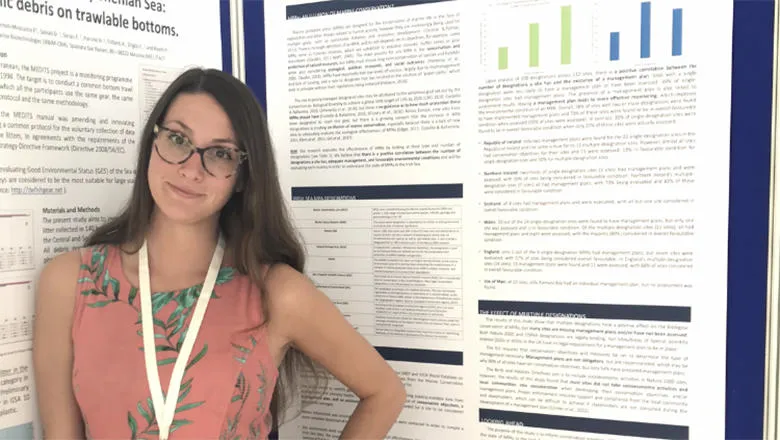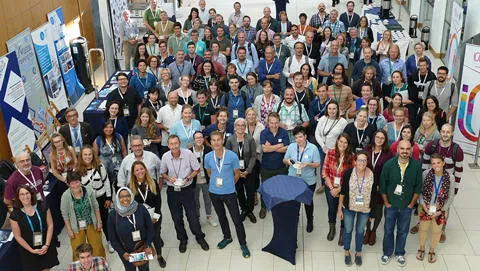04 September 2019
Life as a PhD student: sharing my research
Constance Schere talks about the findings she recently presented on the effectiveness of marine protection areas at a European conference.

Constance, a PhD student in the Department of Geography, talks about the research she presented at the 54th European Marine Biology Symposium.
"Marine protected areas (MPAs) are designed to conserve marine life in the face of exploitation and other threats related to human activity. However, they are increasingly used for things like sustainable fisheries and economic development. I'm currently assessing their effectiveness in the Irish Sea and this summer, I presented the findings from my first doctoral study in poster format at the recent symposium in Dublin.
Terry Dawson, one of my supervisors, also attended the conference and encouraged me to apply. Conferences allow you to not only share your research with your peers, but also give you the chance to learn about recent studies in your field, plus network with other scientists. I was pleased that my research garnered some interest at the symposium.

What was my poster about?
I am particularly interested in the effectiveness of MPAs in the Irish Sea at reaching their biophysical and socioeconomic goals. The Irish Sea is a busy waterway – it provides various ecosystem services to the UK and the Republic of Ireland, such as seafood, renewable energy, tourism and carbon sequestration. Meanwhile, the total human population residing within the 10kms of the Irish Sea's coastline is estimated to be six million people – with its transport, commercial and recreational activities employing upwards of 1.5 million people.
With so many people depending on the Irish Sea for their livelihoods, adequate conservation policies are required – and successful MPAs may be the most effective tool against overexploitation. However, they have reportedly had low levels of success. This is mostly because of mismanagement and a lack of funding. There's also been the creation of numerous 'paper parks', which are MPAs in principle but without their regulations being enforced.
Sites selected to become MPAs may be attributed with one or more designations. For example, one site could be attributed with a national level designation, a European Union level designation, and an international level designation.
The reason for poorly-managed designated areas might be because there is currently no guidance on how much protection MPAs should have under the ambitious goal set out by the Convention on Biological Diversity to increase MPAs globally by 10% by 2020. So, while there may be a 'race' to designate MPAs, this creates an illusion of marine conservation.
I've concluded that:
- Having a management plan as part of the designation leads to more effective monitoring and improved environmental conditions for sites.
- There is a positive correlation between the number of designations a site has and the existence of a management plan (there are 198 designations across 112 sites in the Irish Sea).
- Sites with a single designation were less likely to have a management plan (less than 40% of single-designation areas had management plans versus almost 80% of multiple-designation areas).
- Sites with multiple designations were twice as likely to be monitored and considered to have an overall favourable environmental condition.
I hope that my completed thesis will inform conservation scientists, MPA managers and policymakers on the current state of MPAs in the Irish Sea. My findings can also be used to compare and contrast the management of sites and highlight where improvements are needed. Brexit makes the future uncertain for MPAs in the UK, but these ecological policies should continue to be enforced to ensure successful marine conservation in the Irish Sea and beyond."
